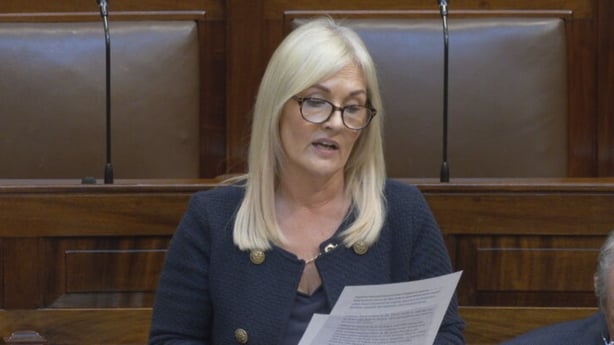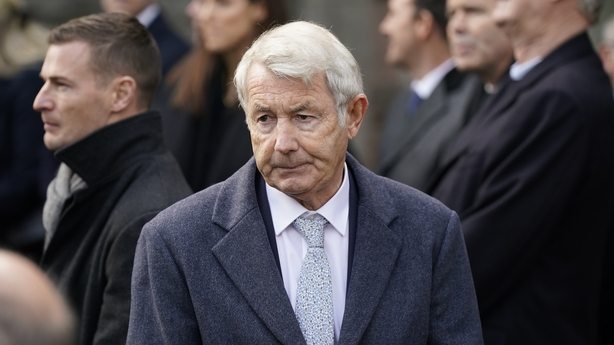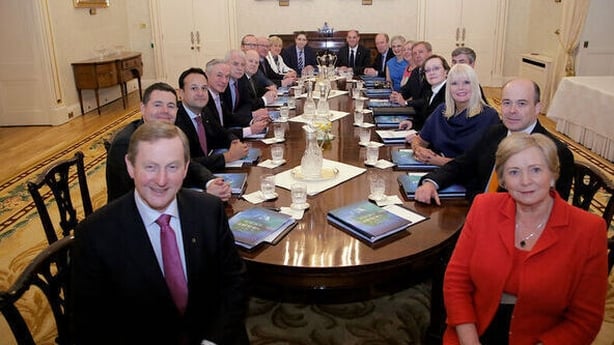As a flurry of independents emerged from every nook and cranny of Leinster House at high noon on Wednesday, you could have almost been forgiven for believing it was 2016 all over again.
Seán Canney, always courteous, waved politely as he walked back to his car.
Kevin ‘Boxer’ Moran jokingly grinned at an RTÉ camera from behind a nearby plant.
Marian Harkin gave a small number of media interviews during the day talking about the need for a government of stability.
And Barry Heneghan, to many the second coming of his political adviser Finian McGrath, strode confidently along the Dáil plinth on his way into a not-so-secret Regional Independents government formation talks meeting.
The sudden interest in a diverse group of Independents who a generation ago would have been an unlikely choice for the third leg of a future coalition stool bore all the hallmarks of the rise of the independents in spring 2016.
Back then, the now defunct Independent Alliance consisting of Finian McGrath, Shane Ross, John Halligan, Seán Canney and Kevin ‘Boxer’ Moran, helped drag the wafer-thin Fine Gael-led minority government over the line.
They were added to by another group of independents including Denis Naughten and Katherine Zappone at the cabinet table as well as Michael Harty, Noel Grealish and, rumour has it, Michael Lowry on a vote-by-vote basis.
Sealing that Government deal was Fianna Fáil with its confidence-and-supply deal.
It wasn’t exactly stable, with impromptu North Korean peace talk plan announcements, deciding a ministerial position by the literal flip of a coin before later backing out of the deal when it came time to swap places, a transport minister focused on judicial reforms outside of his portfolio, another minister resigning over a meal with a businessman and repeated rumours of imminent coalition collapse.
Oh, and the small matter of Brexit.
But, crucially, the 2016-2020 government and what were labelled its “Enda-pendents” did last for four years and nine months, almost an entire term, proving that while it may have been a wobbly ride, a handful of Independents could be a genuine third leg in a government stool.
A belief Fine Gael and Fianna Fáil appear to be increasingly convincing themselves of again, as the 2024 government formation talks begin to kick up a gear a fortnight on from the general election.
Situation in 2024
It is now widely accepted in and around Leinster House that the Regional Independents group have become the most likely coalition partner for Fianna Fáil and Fine Gael.
The Social Democrats and Labour are still officially in the running too, with the former agreeing on Thursday to continue talks and the latter’s leader Ivana Bacik saying on Friday the party will meet with Micheál Martin and Simon Harris early this coming week.

When asked if the real reason for talking again was that Labour doesn’t want to bow out before Holly Cairns’ party she said “no, that’s not a consideration at all” – framing and positioning, of course, never play a role when it comes to political strategy.
However, realistically the Regional Independents have been promoted to the clear first choice for pragmatists in Micheál Martin and Simon Harris’s parties in recent days, with the Fine Gael leader making his views known on Friday.
Mr Harris told reporters at the garda passing-out ceremony in Templemore: “The Regional Independents group have now established a group, these to me are signs of a group of Independent TDs who are serious about going into government.”
That nine-TD Regional Independents group will not come cheap though, as the majority of its members know how to drive a hard bargain.
Mr Canney and Mr Moran have experience of being in government from the 2016-2020 coalition, a collective memory first-time TD Barry Heneghan will also receive from his political adviser Finian McGrath.
Ms Harkin has experience of talks from 2020.
Noel Grealish has previously given support to the government on a case-by-case basis from the opposition benches.
Verona Murphy is known for her combative style.
New TD Gillian Toole and former Sinn Féin TD Carol Nolan have had to fight for their own seats in Dáil Éireann, and like all the others will have clear constituency priorities to put forward.
And the group’s co-ordinator in talks, Michael Lowry, is to put it mildly no stranger to sticking to his own views when it comes to politics, and is an effective political operator.
The Regional Independents have for the moment taken a collective public vow of silence on talks, with a number of them privately telling RTÉ News this is because of the need to keep cards close to their chest due to the early stage of negotiations.
However, it is known that Mr Lowry will meet with Fine Gael and Fianna Fáil early this coming week, and that if talks go well further discussions are likely involving a possible negotiation team of Deputy Lowry, Deputy Harkin and Deputy Canney before the Dáil resumes for a day on Wednesday.
Among the priorities likely to be on the Regional Independents list are two junior minister roles, a “presence” at cabinet which could involve a senior ministry or a super junior position, and support for Ms Murphy’s nomination as Ceann Comhairle.
But, as anyone involved in politics knows, talks just like Christmas gifts are never as simple as what’s on the wish list, with some potential snags already apparent.
Potential snags
Two of the most prominent are, oddly enough, two of the groups most high-profile members: Ms Murphy and Mr Lowry.
After the Regional Independents met on Wednesday, the group confirmed in a statement that it wants to nominate Wexford TD Verona Murphy as the Dáil’s Ceann Comhairle.
A historic moment, it said. The first female Ceann Comhairle in Dáil history, it added.
An open goal for the presumptive coalition, presumably. Well, not quite, so maybe don’t pop the celebratory champagne bottle, just yet.
While all of the above is true, Ms Murphy’s proposed elevation to Ceann Comhairle – complete with a €113,679 basic salary, €141,834 in extra allowances, and a guaranteed seat in the next Dáil – is far from a done deal.

This is because current two-time incumbent, Fianna Fáil’s Seán Ó Fearghail, has put his name forward to contest the role once again, as have party colleagues John McGuinness and Michael Moynihan, and Sinn Féin’s Aengus Ó Snodaigh.
The crowded field is further complicated by the fact there is no love lost between some in Fine Gael and Deputy Murphy, who was the party’s candidate in the November 2019 Wexford by-election before being removed from the general election ticket the following month in the wake of comments on immigration for which she subsequently apologised.
And while officially people have put the past behind them, the fact the Ceann Comhairle votes are by secret ballot when the Dáil returns means that while Simon Harris can promise his party’s support if he is asked for it, there is no guarantee it will actually happen.
Speaking of leaving the past behind them, there is no doubt the presence of Tipperary North TD Michael Lowry, who has emerged from the national political shadows to take his place at the front of the Regional Independents talks team, has led to more than a few raised eyebrows.
The Moriarty Tribunal found that in its view it is “beyond doubt” Mr Lowry had imparted substantive information to Denis O’Brien which was “of significant value and assistance to him in securing [for the Esat Digifone consortium] the [State mobile phone] licence” in the mid-1990’s, while Mr Lowry was a Fine Gael TD and communications minister.
Mr Lowry, Mr O’Brien and others have always rejected and disputed the findings.
Mr Lowry was later barred from running for Fine Gael by then taoiseach John Bruton, before resigning from the party and running as an Independent in 1997, comfortably retaining his seat in every general election since then.
In January of this year, Mr Lowry confirmed he had reached a settlement regarding over €2.8 million in costs arising from legal representation on his behalf during the Moriarty Tribunal.
The tribunal originally awarded him only one-third of his legal costs, after it found that he had not fully co-operated with it.
Asked specifically about Mr Lowry’s political history at a media briefing on Friday, Mr Harris said: “I’m not courting anybody, what I’m doing is engaging with those who are democratically elected to Dáil Éireann in terms of how we form a stable government.”
That engagement, and who is being engaged, is likely to draw the spotlight more in the coming days as talks with the Regional Independents intensify.
Numbers game
Ultimately, of course, in the pragmatic world of post-general election government formation talks, numbers are what count.
And it doesn’t take a maths whizz to figure out that having nine independent TDs officially on board gets Fianna Fáil (48) and Fine Gael (38) comfortably over the 88-seat Dáil majority line.
How much Fianna Fáil and Fine Gael will be willing to give up to secure that breathing space majority remains an open question, with the nitty-gritty of potentially divisive individual TD demands and making sure all sides get enough ministerial titles and positions still to be worked out.

But with the possibility of a deal with the ten-TD Social Democrats or 11-TD Labour lessening; and alternatives like the four-TD Independent Ireland, the two-TD Aontú, or independents Michael and Danny Healy-Rae making a coalition either wafer-thin or too complicated, the increasingly clear reality is that the Regional Independents are becoming the pragmatic coalition partner choice.
Whether it will all end in cheers or tears is unclear, but when it comes to a large group of Independents forming a third leg of a coalition stool, history suggests to be prepared for an eventful ride.
The 2016-2020 Fine Gael-Independents minority government supported by Fianna Fáil in a confidence and supply deal has spawned many books, including from one of that coalition’s key characters, the then transport minister and Independent Alliance member Shane Ross.
The prologue of Mr Ross’s tell-all tale “In Bed With the Blueshirts” gives an insight into the at times fractious nature of the first full coalition with Independents: “It looked like the beginning of the end. Enda Kenny was in full flight at the cabinet table.
“The Constitution held tightly in his hand, the taoiseach was waving it in anger at Finian McGrath and me. He was obviously at the end of his tether.
“We were only six months into government. Everyone knew we could not go on like this. Nearly every week there was a spat, a fudge and a bad taste in the aftermath…The great experiment was faltering.”
That was then and time marches on, with most of the faces on all sides of the current discussion table changing since 2016.
But Micheál Martin and Simon Harris, who were both involved in the 2016-2020 government, are still there.
Both are avid readers.
As another “experiment” looms onto the political horizon, Shane Ross’s book – and its reminders of the ups and downs of coalition life – might be one for them to add to their Christmas present list as the government formation talks page turns to the next chapter.
